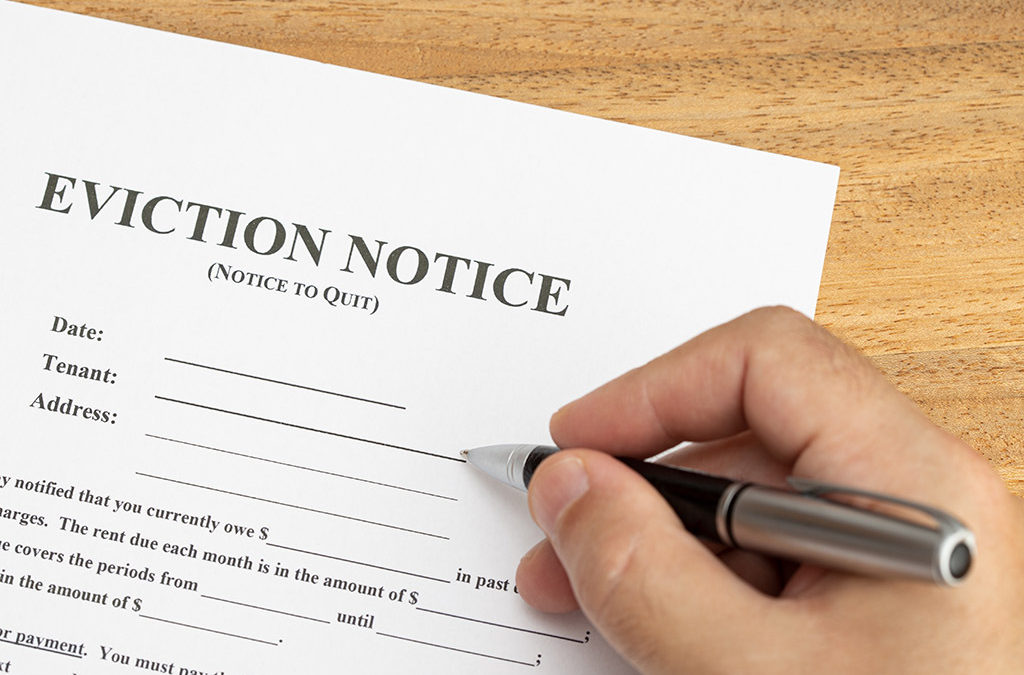
by Rentcore | May 26, 2022 | Tenants
In a perfect world, every human being would be respectful of those around them, including their property. In the world of real estate, that’s not always the case. An experienced property management company knows how to analyze a list of potential tenants, and weed out the bad ones from the group. However, Landlords who opt to rent out their properties by themselves could be in for a bumpy ride.
Those who have found themselves saddled with bad tenants know how frustrating it can be, but all hope is not lost. There are steps Landlords and property owners can take when it comes to dealing with terrible tenants, which will hopefully prevent further escalation.
STAY ON TARGET
Landlords who are forced to deal with terrible tenants should keep their focus solely on evicting them out as fast as possible. These bad apples will try to obfuscate, make excuses, and play for sympathy in an attempt to maintain their position, which is why it’s important for Landlords to remain steadfast.
Of course, there may be times when tenants are simply going through a bad time, and need a little understanding, but if the problem becomes chronic, there’s no recourse but to get them out. There’s no sense dealing with the headaches and stresses of a terrible tenant, especially when there are so many wonderful ones waiting in the wings who will respect your property, pay on time, and give you peace of mind.
KEEP A PAPER TRAIL
One of the biggest mistakes Landlords and property owners make is neglecting to document a bad tenant’s history. Without a paper trail, it’s extremely difficult to build a case against them, especially if they have a history of non-payment, bad behavior and other offenses.
Be as thorough as possible, including dates, times and notes about each encounter or problem. The more information you have, the more legit your case will become. Maintaining a log of emails and texts sent by tenants, which can provide context about their behavior is equally important. If possible, take pictures of property damage, or other violations of the contract.
SEND AN EVICTION NOTICE
When dealing with a terrible tenant, it’s paramount that Landlords follow the guidelines in the Landlord and Tenant Act. Doing so will give the correct impression that the Landlord in question has done everything possible to rectify the situation, to no avail. If tenants are breaking the rules of the contract, or are behind on rent, it’s time to draft an eviction notice.
The purpose of the eviction notice is twofold. First, it shows that you aren’t taking matters into your own hands, and you’re obeying the rules. Secondly, it will no doubt factor into the next phase of the process, which is getting an order from the Landlord and Tenant Board to officially remove the tenant from the premises. When sending the eviction notice, be sure to use a reputable courier with a tracking number, to prevent tenants from claiming that they never received it.
The best case scenario is that late-paying tenants learn to pay on time to prevent any future notices from being filed, and destructive, belligerent tenants leave voluntarily of their own accord. The worst case involves taking further action via the Landlord and Tenant Board.
UNDERSTANDING THE LAW
Eviction laws vary by province, but the general consensus is that it can be very hard to evict a tenant as a rule. Therefore, following the aforementioned proper procedures can expedite the process, while making the experience that much smoother. The Landlord and Tenant Board must provide an order so that tenant belongings can be removed, the locks changed, and the eviction process can be completed.
Once the meeting with the LTB is complete, the tenant in question will no doubt be given a finite amount of time to get their belongings out, so that you can reclaim your property. Following the above steps guarantees that your case looks solid and bulletproof, which is extremely important. Even one small missing detail can threaten to derail the entire process, forcing you to start over.
HIRE A PROPERTY MANAGEMENT COMPANY
Needless to say, the risks of renting out your property are noteworthy, which is why it’s important to always hire a property management company to oversee the details. At RentCore, we are experts at detecting red flag tenants before they make it through the screening process. In the unlikely event that a bad tenant manages to slip past our net, we have the experience and resources necessary to effectively remove them with little effort.
All things considered, most prospective tenants are good folks who won’t give property owners any trouble, and simply want a nice place to live. The best tenants are the ones that Landlords dream of, and give hearty recommendations down the road.
RentCore is ready to assist you with renting out your property to the absolute best tenants in your area, so make sure to contact us directly so we can get started!

by Rentcore | May 19, 2022 | Tenants
Many first-time tenants think renting a property means everything is taken care of. While there are certain advantages to being a tenant, there are things they need to be aware of when it comes to maintenance, upkeep and expectations.
Renting out a property means respecting the Landlord who owns or maintains it, just as you would your own home. Naturally, you aren’t responsible for every single part of the property, but there are certain expectations Landlords place on their tenants, which are easy to follow.
ROUTINE MAINTENANCE & CLEANLINESS
Needless to say, renting a property does not give a tenant carte blanche to behave badly, or make a mess. It’s the responsibility of the tenant to take the garbage out, clean appliances like refrigerators and stoves, and maintain overall cleanliness of the property.
While some tenants may think it’s their “right” to live in squalor-like conditions, the truth is a bit more complex. Mold growth in bathrooms can be a health hazard, as can the buildup of rust and grime. Excess dirt can damage appliances, leading to unnecessarily and costly repairs or replacement purchases. And of course, leaving garbage strewn about invites vermin, including cockroach or fruit fly infestations, maggots, etc. This should be unacceptable at all times, regardless of whether the home is yours, or not.
PREVENTING DAMAGE
Tenants should exercise the utmost care when renting out a property. Property insurance was never designed to cover reckless behavior that leads to excess damage. Therefore, it’s important that tenants exercise responsibility and care when moving furniture, inviting guests over, or handling various appliances. Similarly, Landlords who allow pets on the premises expect tenants to take responsibility for any damages that might be incurred.
It’s important for tenants to be aware of other potential forms of damage, such as tampering with smoke or carbon monoxide detectors, blocking emergency exits, or misusing rooms for a purpose not originally intended. And finally, tenants should always get permission from the Landlord before proceeding with painting the walls, or other renovations. They may look nice to you, but the Landlord may consider the property to be irrevocably damaged, and hold you responsible.
REPORTING ISSUES PROMPTLY
Normal wear and tear is standard fare with any property, but tenants can exercise a bit more caution by performing an inspection, prior to moving in. Make sure to identify any damages or problem areas of a property beforehand, so they can be dealt with accordingly. Oftentimes, Landlords will agree to fix these issues before you move in, which can lead to a smoother transaction.
However, it’s possible that Landlords may miss these areas completely, and hold the tenant responsible for damages at a later date. This misunderstanding can quickly blossom into a colossal (and costly) headache, so tenants would be wise to protect themselves. Human beings are fallible, and it’s important to talk about any potential issues before the tenant moves in, at which point they may become harder to deal with.
Once established, tenants should keep a close eye on the property, and perform the occasional routine inspection to make sure everything is Okay. It’s easy to miss things like water leakage from bathtubs, faucets or broken air conditioners, as well as exterior damage. Keep a checklist handy, and perform inspections once every month or two, just to be sure everything’s in tip-top shape. The longer a problem is left to sit, the greater the financial damage incurred, and Landlords may hold you responsible. When in doubt, always think of the property as your own, and give it the same care and attention. After all, it only takes a few minutes to give the property a once-over.
LANDSCAPING AND MAINTENANCE
Depending on your rental type and contract, Landlords may either hire third-party lawn mowers and snow removal companies, or they may dictate that you bear the responsibility. This is usually established early on, but it’s best to get it in writing before moving in. Some tenants cannot perform these tasks due to health issues, though that won’t hold up if there’s a conflict.
Most tenants have no problem cutting grass or shoveling snow from walkways and paths, but it’s best to know this moving forward. Sometimes, Landlords will hire contractors for larger duties, while still expecting tenants to clip the occasional hedge, or shovel and salt the front porch and walkway during wintertime. Remember, Landlords and property managers may be liable for injuries sustained by visitors, delivery people and even local authorities, so it’s important to abide by their wishes.
CONCLUSION
Common sense is a huge part of being a tenant, but there’s something to be said for courtesy and consideration, as well. Triple-A tenants know how beneficial it is to respect another’s property, maintain it, and give the Landlord peace of mind. This can lead to glowing reviews and reference letters down the road, as well as extra perks that can be negotiated with future property owners.
Landlords tend to be wary of bad tenants, and they’ll do everything they can to prevent one from renting their property. Behaving like a dream tenant creates a much better and more enjoyable dynamic between both parties, while at the same time preventing any unfortunate legal or financial burdens. When in doubt, communicate openly with your Landlord to properly lay out the ground rules, or reach an amicable compromise. Many Landlords are more flexible than you might think, provided they trust their tenants with the maintenance and care of their property.


